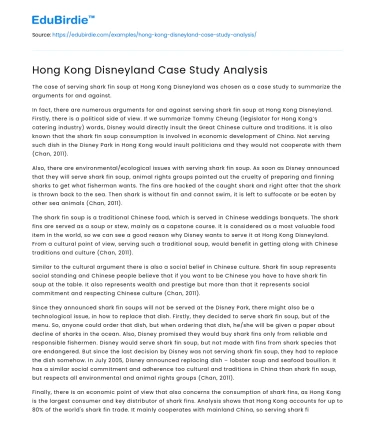The case of serving shark fin soup at Hong Kong Disneyland was chosen as a case study to summarize the arguments for and against.
In fact, there are numerous arguments for and against serving shark fin soup at Hong Kong Disneyland. Firstly, there is a political side of view. If we summarize Tommy Cheung (legislator for Hong Kong’s catering industry) words, Disney would directly insult the Great Chinese culture and traditions. It is also known that the shark fin soup consumption is involved in economic development of China. Not serving such dish in the Disney Park in Hong Kong would insult politicians and they would not cooperate with them (Chan, 2011).
Save your time!
We can take care of your essay
- Proper editing and formatting
- Free revision, title page, and bibliography
- Flexible prices and money-back guarantee
Also, there are environmental/ecological issues with serving shark fin soup. As soon as Disney announced that they will serve shark fin soup, animal rights groups pointed out the cruelty of preparing and finning sharks to get what fisherman wants. The fins are hacked of the caught shark and right after that the shark is thrown back to the sea. Then shark is without fin and cannot swim, it is left to suffocate or be eaten by other sea animals (Chan, 2011).
The shark fin soup is a traditional Chinese food, which is served in Chinese weddings banquets. The shark fins are served as a soup or stew, mainly as a capstone course. It is considered as a most valuable food item in the world, so we can see a good reason why Disney wants to serve it at Hong Kong Disneyland. From a cultural point of view, serving such a traditional soup, would benefit in getting along with Chinese traditions and culture (Chan, 2011).
Similar to the cultural argument there is also a social belief in Chinese culture. Shark fin soup represents social standing and Chinese people believe that if you want to be Chinese you have to have shark fin soup at the table. It also represents wealth and prestige but more than that it represents social commitment and respecting Chinese culture (Chan, 2011).
Since they announced shark fin soups will not be served at the Disney Park, there might also be a technological issue, in how to replace that dish. Firstly, they decided to serve shark fin soup, but of the menu. So, anyone could order that dish, but when ordering that dish, he/she will be given a paper about decline of sharks in the ocean. Also, Disney promised they would buy shark fins only from reliable and responsible fishermen. Disney would serve shark fin soup, but not made with fins from shark species that are endangered. But since the last decision by Disney was not serving shark fin soup, they had to replace the dish somehow. In July 2005, Disney announced replacing dish – lobster soup and seafood bouillon. It has a similar social commitment and adherence too cultural and traditions in China than shark fin soup, but respects all environmental and animal rights groups (Chan, 2011).
Finally, there is an economic point of view that also concerns the consumption of shark fins, as Hong Kong is the largest consumer and key distributor of shark fins. Analysis shows that Hong Kong accounts for up to 80% of the world's shark fin trade. It mainly cooperates with mainland China, so serving shark fin soup will benefit Hong Kong Disneyland. But such a dish would cause a leak in the attendance of children at the Disney Park in Hong Kong. Hong Kong schoolchildren vowed to boycott the Disney Park.
Serving shark fin soup at Hong Kong Disneyland is a rather controversial undertaking, as a case study showed, with strong arguments both for and against. In any case, the final decision rests with Disney.






 Stuck on your essay?
Stuck on your essay?

